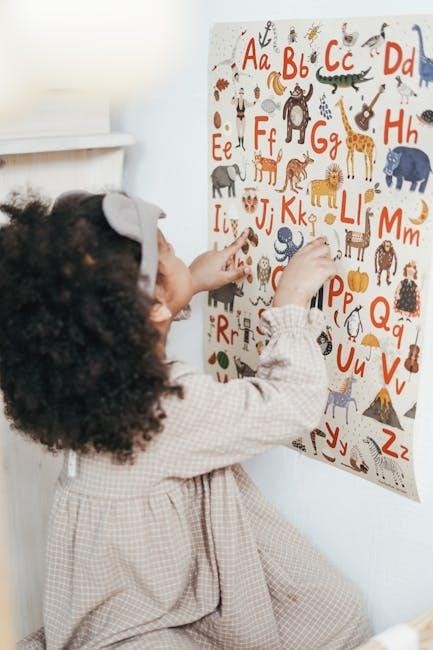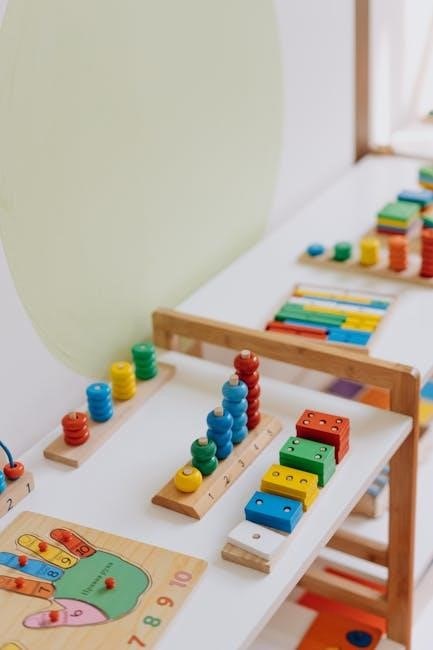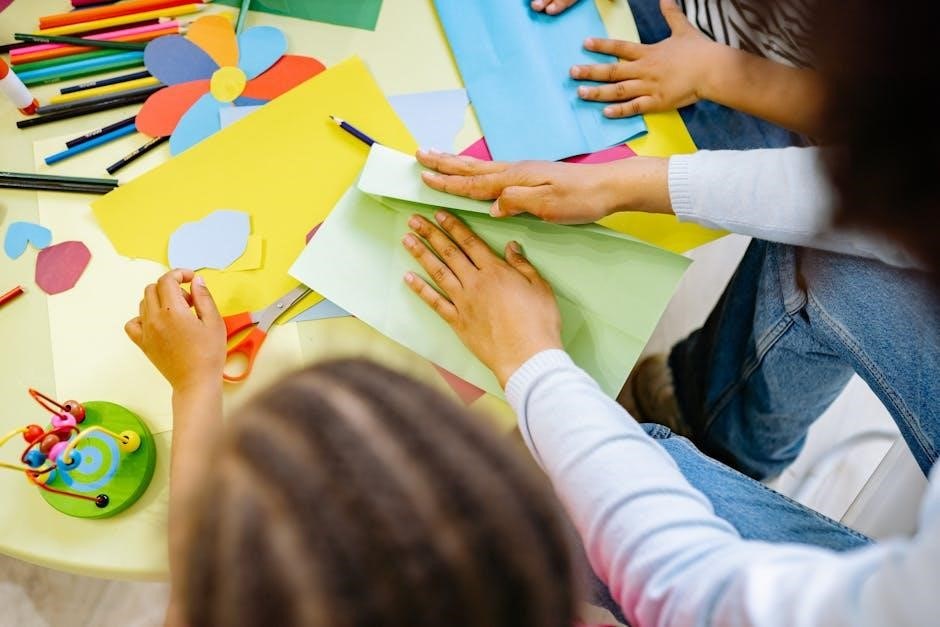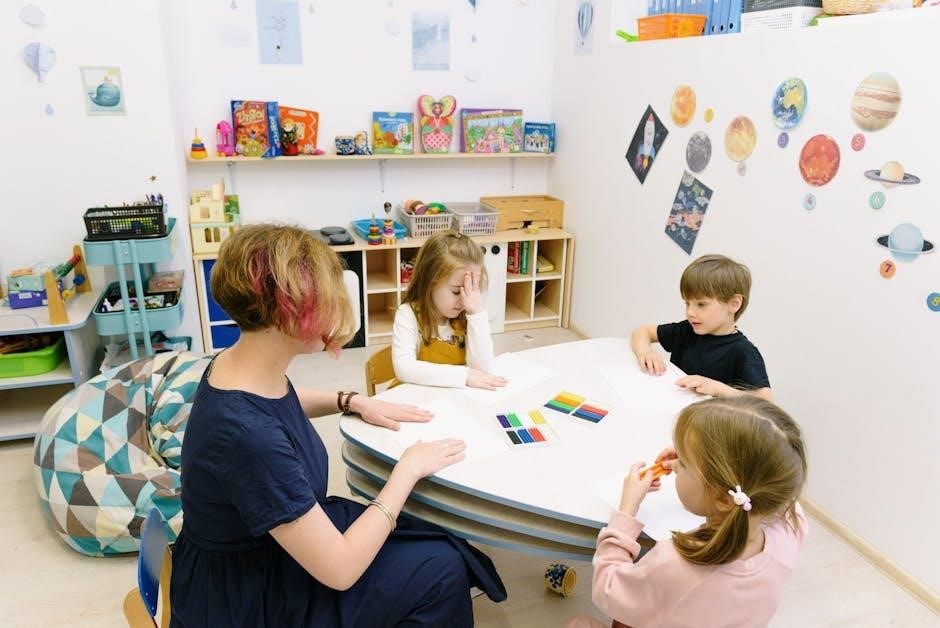
Here’s the text for the specified section‚ adhering to all instructions:
Kindergarten Reading Comprehension: An Overview
Kindergarten reading comprehension introduces foundational skills. These skills involve understanding simple stories. Worksheets often include questions. Exercises focus on reading sentences. Passages‚ riddles‚ and sequencing are also used. These build essential literacy skills.
Here’s the text for the specified section‚ adhering to all instructions:
Importance of Reading Comprehension in Kindergarten
Reading comprehension in kindergarten is vital for literacy development. It enables children to understand written text‚ building a solid foundation for future learning. Early comprehension skills foster critical thinking and vocabulary expansion. Worksheets with stories and questions help assess understanding. Developing these skills in kindergarten sets the stage for academic success; It also builds a lifelong love for reading and learning.
Here’s the text for the specified section‚ adhering to all instructions:
Benefits of Early Reading Comprehension Skills
Early reading comprehension skills offer numerous benefits. They enhance vocabulary and improve critical thinking abilities. Comprehension allows children to grasp main ideas and understand sequences. Worksheets aid in developing these crucial skills early on. These skills contribute to better academic performance across subjects. Early comprehension fosters a love for reading. This love encourages lifelong learning and intellectual curiosity. It also helps with overall communication skills.
Here’s the text for the specified section‚ adhering to all instructions:

Free Printable Kindergarten Reading Comprehension Worksheets
Free printable kindergarten reading comprehension worksheets are available. These worksheets help improve literacy. They offer simple stories. Exercises include questions. These resources support early reading development.
Here’s the text for the specified section‚ adhering to all instructions:
Accessing Free Worksheets Online (PDF Format)
Accessing free worksheets online in PDF format is straightforward. Many websites offer downloadable reading comprehension activities specifically designed for kindergarten students. These resources often include simple stories with accompanying questions. Educators and families can easily find and print these PDFs for convenient use at home or in the classroom. This accessibility makes it simple to support early literacy development.
Here’s the text for the specified section‚ adhering to all instructions:
Types of Comprehension Activities Included
Kindergarten comprehension activities encompass various exercises. These include simple stories followed by questions‚ fostering understanding. Worksheets feature exercises on reading sentences and short passages. Riddles engage young minds‚ promoting critical thinking. Sequencing activities help build logical reasoning skills. Phonics exercises support decoding abilities. Sight word recognition enhances fluency. These diverse activities collectively boost early reading comprehension abilities in kindergarteners.
Here’s the text for the specified section‚ adhering to all instructions:

Key Skills Developed Through Worksheets
Worksheets foster key skills. These include vocabulary development. Reading sentences and passages are targeted. Sequencing skills are honed. Worksheets support literacy development. They nurture a lifelong passion.
Here’s the text for the specified section‚ adhering to all instructions:
Vocabulary Development
Vocabulary development is crucial in kindergarten. Worksheets introduce new words. These words are often presented within simple stories. Context clues help children understand meanings. Sight words are integrated to build recognition; Repetition reinforces vocabulary acquisition. Pictures support understanding for visual learners. Activities encourage word usage in sentences. Expanding vocabulary enhances reading comprehension skills from an early age‚ nurturing a lifelong love for reading.
Here’s the text for the specified section‚ adhering to all instructions:
Reading Sentences and Passages
Reading sentences and passages is vital for kindergarteners. Worksheets offer simple sentences for practice. Short‚ decodable passages build confidence. These passages often use sight words. Text-based questions assess comprehension. Activities focus on understanding main ideas. Reading fluency improves with repeated practice. Engaging content keeps children motivated. Early exposure to reading develops essential literacy skills. It is a crucial step towards becoming proficient readers and lifelong learners.
Here’s the text for the specified section‚ adhering to all instructions:
Sequencing Skills
Sequencing skills are essential for kindergarten reading comprehension. Worksheets often include activities for ordering events. Children learn to identify the beginning‚ middle‚ and end of a story. Visual aids like pictures help illustrate the sequence. These exercises improve logical thinking and comprehension. Understanding sequence enhances storytelling abilities. Activities may involve arranging sentences in the correct order. Sequencing helps build a strong foundation for understanding narratives. This skill is important for reading and writing development.
Here’s the text for the specified section‚ adhering to all instructions:
Engaging Activities and Exercises
Engaging activities boost kindergarten comprehension. Simple stories with questions captivate young learners. Riddles challenge their thinking. Identifying main ideas improves understanding. These exercises make learning fun. They also build critical thinking skills.
Here’s the text for the specified section‚ adhering to all instructions:
Simple Stories with Questions
Simple stories followed by questions are perfect for kindergartners. These stories improve reading comprehension. They help children understand the text. The questions test their understanding. Worksheets often include these. They also help build fluency. Kindergarten reading passages with questions aid development. These activities ensure that children grasp the main ideas. They also facilitate a love for reading from an early age‚ creating confident young readers.
Here’s the text for the specified section‚ adhering to all instructions:
Riddles
Riddles in kindergarten reading comprehension worksheets engage young minds. These are fun‚ light activities for students. They promote critical thinking skills. Students improve vocabulary development. Riddles encourage understanding text. Children learn to infer and deduce. These activities make learning fun. They also can be included during breaks. Riddles can be part of a game show scenario. This reinforces comprehension skills delightfully‚ making learning enjoyable and very effective.
Here’s the text for the specified section‚ adhering to all instructions:
Identifying Main Ideas
Identifying main ideas is crucial in kindergarten comprehension. Worksheets should include activities. This helps kids grasp core concepts. Focus is on simple stories and passages. These are designed for young readers. Activities should encourage critical thinking. Students should understand the central point. Identifying main ideas helps reading ability. Exercises include what the story is about. Recognizing main ideas improves comprehension skills. This is a key component of early literacy development‚ especially for kindergarteners.
Here’s the text for the specified section‚ adhering to all instructions:
Integrating Phonics and Sight Words
Integrating phonics and sight words enhances reading. Worksheets include exercises focused on phonics. These also focus on sight word recognition. This combined approach supports early literacy. It is perfect for kindergarten development.
Here’s the text for the specified section‚ adhering to all instructions:
Phonics Exercises
Phonics exercises in kindergarten reading comprehension worksheets help kids learn sound-letter relationships. These exercises often involve matching sounds to letters. They can also include blending sounds to form words. Worksheets may feature CVC (consonant-vowel-consonant) words. Activities could include identifying beginning‚ middle‚ and ending sounds. These exercises are critical for decoding skills. These improve reading fluency and comprehension. Ultimately these exercises make learning engaging.
Here’s the text for the specified section‚ adhering to all instructions:
Sight Word Recognition
Sight word recognition is a key component in kindergarten reading comprehension. Worksheets often include activities focused on identifying common sight words. These are words that children learn to recognize instantly. Exercises involve matching sight words to pictures. Activities may include reading sentences with sight words. Repeated exposure helps children memorize these words. This skill enhances reading fluency. Fluency supports improved reading comprehension. Worksheets make sight word practice fun.
Here’s the text for the specified section‚ adhering to all instructions:
Making Learning Fun
Making learning fun is key for kindergarteners. Use game-based activities to enhance engagement. Integrate worksheets during breaks. Make it a light‚ enjoyable experience. Pretend it’s a game show to earn points. Reward effort with small prizes.
Here’s the text for the specified section‚ adhering to all instructions:
Game-Based Activities
Game-based activities make learning reading comprehension fun for kindergarteners. Transform worksheets into interactive games. Award points for correct answers. Offer small prizes for participation. Pretend you’re on a game show. This helps make learning feel less like work. It encourages active participation. Make reading comprehension an exciting and rewarding experience.
Here’s the text for the specified section‚ adhering to all instructions:
Using Worksheets During Breaks
Using worksheets during breaks can reinforce learning. This approach makes it a fun‚ light activity. It prevents learning fatigue. If a child shows interest‚ incorporate worksheets. Avoid making it feel like a chore. Create a relaxed and positive atmosphere. This enhances learning without pressure. It helps them develop comprehension skills in a playful environment.
Here’s the text for the specified section‚ adhering to all instructions:
Resources for Educators and Families
Educators and families can find worksheets online. These resources support literacy development. They are perfect for young learners. Worksheets enhance reading comprehension skills. They are suitable for both home and classroom use.
Here’s the text for the specified section‚ adhering to all instructions:
Worksheets for Home Use
For home use‚ worksheets offer convenient learning. Parents can easily download and print them. These free PDF resources support reading comprehension. They include simple stories and exercises. These activities are perfect for breaks or when children show interest. Parents can create fun game-like activities. This makes learning enjoyable‚ while supporting vocabulary development and comprehension skills.
Here’s the text for the specified section‚ adhering to all instructions:
Worksheets for Classroom Use
In the classroom‚ reading comprehension worksheets are invaluable. They aid in literacy development. Teachers can use free PDF worksheets. Resources support phonics exercises. Worksheets help with sight word recognition. Engaging activities enhance learning. Teachers can integrate simple stories with questions. This makes learning effective and fun. Worksheets help develop vocabulary and sentence comprehension skills in kindergarten students.
Here’s the text for the specified section‚ adhering to all instructions:
Examples of Reading Comprehension Topics
Topics for kindergarten reading comprehension can vary widely. Popular topics include sea animals. Another engaging subject is firefighters. These themes provide context. They also make learning more relatable.
Here’s the text for the specified section‚ adhering to all instructions:
Sea Animals
Sea animal-themed reading comprehension worksheets engage young learners. These worksheets often feature simple stories. The stories talk about various marine creatures. Children learn about fish‚ sharks‚ and dolphins. Comprehension questions follow the stories. These questions assess understanding of the text. Worksheets may include vocabulary building exercises. Identifying different sea animals in pictures is a fun activity. These activities help develop reading comprehension skills in kindergarten.
Here’s the text for the specified section‚ adhering to all instructions:
Firefighters
Firefighter-themed reading comprehension worksheets are educational resources. These worksheets introduce young children to the role of firefighters. They include engaging articles about firefighters’ duties. Simple questions follow these articles. Children answer questions to test understanding. Worksheets build comprehension skills. They also teach about community helpers. Vocabulary development is another benefit. Learning about safety is an important aspect. These worksheets promote reading and comprehension.
Here’s the text for the specified section‚ adhering to all instructions:

Developing Fluency with Reading Passages
Reading passages enhance fluency. Short passages suit beginners. These use sight words. CVC words aid development. Worksheets contain text-based questions. These questions assess understanding. This builds early reading skills.
Here’s the text for the specified section‚ adhering to all instructions:
Short Passages for Beginning Readers
These short reading comprehension passages are great for kindergarten or first-grade students. They are perfect for beginning readers and use common sight words and CVC words. Designed to help students reading at a kindergarten level start to develop their comprehension skills‚ they also help build fluency and sight word recognition. Each page includes a short passage and three comprehension questions to practice early ELA skills.
Here’s the text for the specified section‚ adhering to all instructions:
Text-Based Questions
Text-based questions in kindergarten reading comprehension worksheets help assess understanding. These questions follow short passages and simple stories. Children answer questions to test their understanding. Worksheets often include questions about animals or firefighters. The questions focus on early ELA skills and reading fluency. They develop critical thinking. These questions ensure kids understand what they read. They enhance language skills and reading abilities.
Here’s the text for the specified section‚ adhering to all instructions:

Enhancing Writing Skills
Enhancing writing skills is possible through worksheets. Activities include identifying animals. There is also comprehension‚ and exploring rhyming words. Writing practice helps early learners. They have better writing abilities. Worksheets support literary development of young learners.
Here’s the text for the specified section‚ adhering to all instructions:
Writing Practice Activities
Writing practice activities in kindergarten worksheets enhance language skills. These activities involve identifying animals. They also involve writing practice. These activities also improve comprehension. Exploring rhyming words is also beneficial. Worksheets often include simple stories. These stories are followed by questions that test understanding. These exercises help kids understand what they read. They also help improve writing skills.
Here’s the text for the specified section‚ adhering to all instructions:
Book Report Forms
Book report forms are valuable tools for assessing comprehension. These forms encourage children to recall key details. They also encourage children to summarize the plot. Forms can include sections for character descriptions. Students also learn to identify the main idea. These forms will also encourage drawing a favorite scene. Book report forms also enhance writing skills. These skills are essential for literacy development.
Here’s the text for the specified section‚ adhering to all instructions:
Additional Resources
Additional resources enhance learning. Flashcards support sight word recognition. Children’s stories build comprehension skills. Online platforms offer interactive exercises. These tools provide diverse learning experiences. Resources help build literacy foundations.
Here’s the text for the specified section‚ adhering to all instructions:
Flashcards
Flashcards are a valuable tool. They help with sight word recognition. Flashcards can reinforce vocabulary development. Use them for quick review sessions. Incorporate flashcards into game-based activities. This makes learning fun and engaging. Flashcards support early reading skills. They are simple to use at home or in the classroom. Use flashcards to improve reading comprehension. Flashcards help with memory retention. They build a solid foundation for reading success.
Here’s the text for the specified section‚ adhering to all instructions:
Children’s Stories
Children’s stories are engaging tools. They help in developing comprehension skills. Stories often include comprehension exercises. These can be simple questions. Focus is on the main idea. Sequencing events is also important. Stories build fluency and sight word recognition. Decodable passages support young readers. Select stories with text-based questions. Stories enhance early reading skills. They foster a love for reading. Short stories are ideal for kindergarten.
Library Visits
Here’s the text for the specified section‚ adhering to all instructions:
Beyond Worksheets: Creating a Love for Reading
Creating a love for reading involves more than worksheets. It means encouraging reading at home. Regular library visits are also beneficial. This supports a lifelong passion for books.